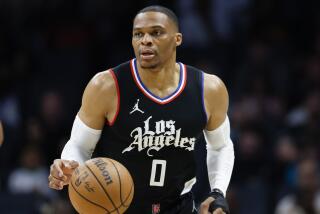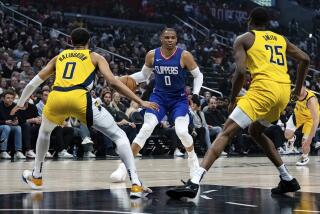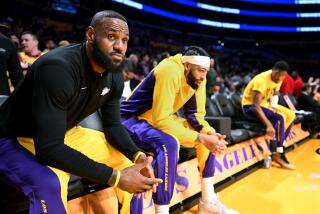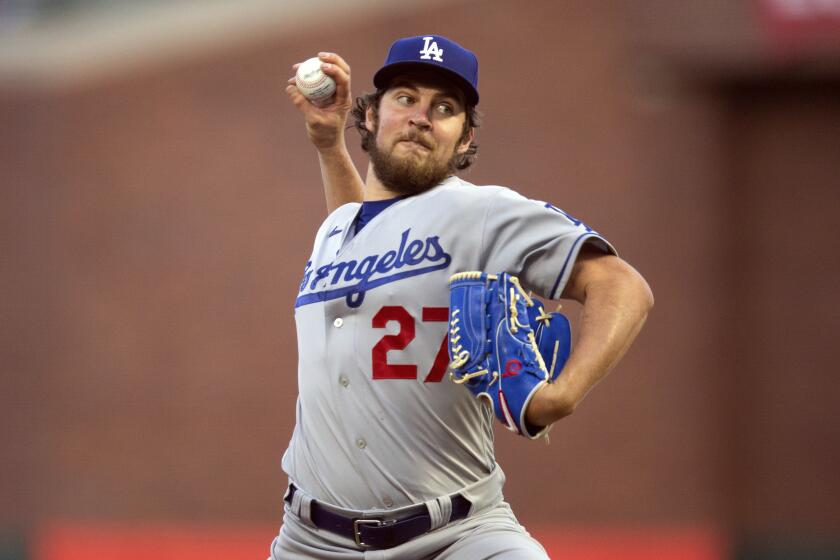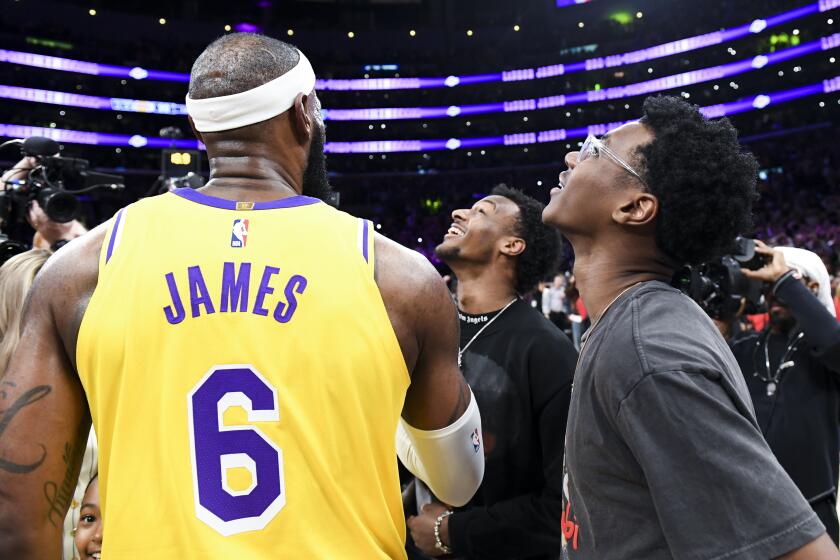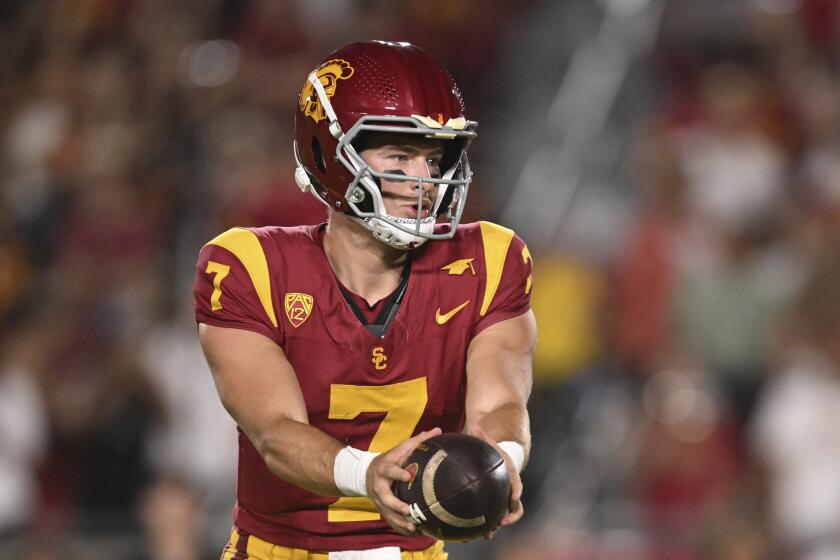In Seattle, Thunder fans are hard to find during NBA Finals
NBA fans in this city are searching for a new team. One of them, a fellow named Rich, is also looking for a new barber.
These two facts are connected.
While waiting for a haircut last week at the Roosevelt Barber Shop in the north end of town, Rich chimed in on a group conversation about the NBA Finals and made a socially fatal misstep. He said he wouldn’t mind seeing the Oklahoma City Thunder — the relocated Seattle SuperSonics — win a championship.
He was promptly shown the door.
“This guy jumps into the conversation and says, ‘I’m a Thunder fan. What’s wrong with Kevin Durant winning a ring?’” barber John Song recalled. “I immediately looked at him, and in my head I was like, ‘I can’t even talk to this guy.’ I just told him to leave.”
Said Rich, who declined to give his last name for this story: “It was surprising and a little sad because I’d been a customer there for three years. They’re trying to vilify me as an anti-Sonics person. I’d just like to see Kevin Durant succeed. Oklahoma City has already stolen our team. It’s over and done for.”
That’s not a widely held sentiment among those fans whose blood runs green and gold. To them, the pain of losing the Sonics after 41 seasons is as raw now as it was when the team was relocated in 2008. And that the Thunder is now in the Finals — without enduring the growing pains of a typical newly minted team — only gives the knife another twist.
“I was a huge Sonics fan,” said Anders Miller, a fishmonger in Pike Place Market who entertains crowds by catching salmon tossed at him from three-point range. “I personally was so devastated by them leaving that I don’t even watch the NBA anymore. I didn’t watch all season, but now that it’s the Finals I watched the game the other night and it stinks.”
Durant and reserve forward Nick Collison are the only Thunder players who played for the team in Seattle, though star point guard Russell Westbrook was drafted in the first round by the Sonics in June 2008, days before the relocation became official with the removal of the last legal impediment.
The franchise has moved on.
“We kind of cleaned our slate, I guess, once we got here to Oklahoma City,” Durant said. “We still remember everything from the teams in Seattle that were going to the Finals and won the Finals in ‘79, and the Gary Paytons, the Shawn Kemps, Detlef Schrempfs, guys that played in this organization. But it feels good to have an opportunity to bring something here to Oklahoma City.”
The Sonics’ saga is one that should resonate with many fans of the Los Angeles Rams, who left behind a legacy of bitterness — particularly toward then-owner Georgia Frontiere — when the NFL team moved from Anaheim to St. Louis after the 1994 season. Five years later the Rams won the Super Bowl . . . something they never did in Southern California.
How deep does the bitterness run today in the Pacific Northwest? According to an ESPN poll, Washington is the only state outside of Florida in which a majority of basketball fans are pulling for LeBron James and the Miami Heat to beat the Thunder in these Finals.
“It’s a complete travesty that there’s no team here, because Seattle is a basketball city first and foremost,” said Adam Brown, producer of the award-winning documentary “Sonicsgate: Requiem for a Team,” which chronicles the fight to keep the team in Seattle and the bitter relocation of the franchise.
“The Sonics were more closely woven into the Seattle and Washington state community than any of the other pro sports teams, simply because they were here the longest, they had the most success on the court, being in the playoffs almost every year of my lifetime at least, and taking home the only championship in major league pro sports that this city has ever seen. It was the perfect storm of corporate greed and political ineptitude that ripped the team away, and it’s a testament to Sonics fans that we’re still here making noise.”
That noise echoed through the streets of the city’s Pioneer Square district Thursday, as a crowd variously estimated at 3,000 to 6,000 packed into Occidental Park for a rally to lure an NBA team. They waved printed yellow placards reading “Bring ‘Em Back!” and bounced — it was too crowded to dance — to a live performance by a Seattle band.
Former Sonics stars Payton, Kemp and Schrempf made appearances to raucous cheers, as did the boyish Chris Hansen, the hedge-fund manager who has offered to contribute almost $300 million for a proposed arena south of downtown and $500 million to buy an NBA team. Hansen’s bid has gathered momentum, with heavyweights such as Steve Ballmer, chief executive of Microsoft, and the Nordstrom family pledging financial support.
“I have enough money and I don’t have a desire to be a mega-billionaire,” said Hansen, 44, shaking hands and smiling for snapshots backstage at the rally. “If you can do great things, whether it’s for charity or something like this for a community, while you’re alive and enjoy it, that’s what you should do. This is an opportunity for me to give something back to the community, and it’s something I’m very passionate about.”
The NBA isn’t going to add an expansion franchise, and the team most likely to move is the Sacramento Kings, meaning to get a team Seattle would have to swipe one from another city. That irony isn’t lost on the people of Seattle.
“The fig leaf that Seattle fans have on this is that Hansen will not be . . . duplicitous . . . when he goes after Sacramento or whoever else it might be,” said longtime Seattle sports columnist Art Thiel, now of Sportspressnw.com. “He will be straightforward that the team is going to be moved, which is better than what [Thunder owners] Clay Bennett and Aubrey McClendon did when they were lying about their desire to stay in Seattle.”
When it comes to affixing blame for the Sonics’ relocation, the fingers point in every direction. It was the state Legislature, which repeatedly rejected committing taxpayer dollars to a new venue. It was former Seattle mayor Greg Nickels, who let the club out of its Key Arena lease two years early in exchange for a $45-million payout. It was NBA Commissioner David Stern, whom critics accuse of creating an environment in which an arena that opened in 1995 would be economically obsolete by 2002. It was Oklahoma businessmen Bennett and McClendon, who were secretly determined to move the team to their state — despite Bennett’s promised intention to keep the Sonics in Seattle.
Most of all, in the minds of Sonics fans, it was Starbucks billionaire Howard Schultz, once a local icon, who presided over the decline of the team, demanded a new arena, then sold the club — along with its championship trophy, banners and statistical history — to the interlopers from Oklahoma City.
“Howard Schultz, he’s the villain, he’s the one that got it this way,” said Payton, the All-Star point guard who famously feuded with Schultz before being traded to Milwaukee in 2003. “He made promises he couldn’t keep, and he sold the team. . . . He was sitting there in the front row for our games, and then all of a sudden he does this. All this is because of him.”
When Schultz bought the Sonics in 2001, his timing to get a new arena could not have been worse. The city was still paying off the Key Arena renovation, had recently opened a new ballpark for the Mariners, and was a year away from cutting the ribbon on a new stadium for the NFL’s Seahawks. Couple that with the burst of the dot-com bubble, and there was little appetite to commit public money for another new sports venue.
Hansen’s proposal includes as much as $200 million in public bonds, although his personal contribution would dwarf any such offerings by owners of the Sonics.
“It’s a good deal across the board,” King County Executive Dow Constantine said. “But people have long memories. They remember other stadium and arena deals here and elsewhere that were not as secure for the public, that were not a good deal. So we need to overcome memories and help people understand what’s really on paper here.”
In a city that feels so badly burned, there is also hope.
“This ownership group is less greedy than the prior one,” said Scott Carsberg, chef-owner of Bisato, an Italian restaurant downtown. “I don’t think there’s any secret agenda.”
Kevin Calabro, play-by-play announcer for the Sonics from 1987 until their departure four years ago, said the success of the Thunder has galvanized the Seattle fan base.
“If the Thunder were a boring team, a .500 team, a team that wasn’t in the playoffs, I don’t think there would be nearly the emotion, passion desire that Seattle has to get back into the league,” Calabro said. “Wouldn’t be nearly the intense feelings that people have. Oklahoma City getting to the Finals is probably the best thing that could have happened to revive the Sonic movement in Seattle.”
In the meantime, Seattle finds itself in the still-unfamiliar, uncomfortable, almost unbelievable position of being on the outside looking in.
For a city known for its breathtaking vistas, that’s the worst kind of view.
Times staff writer Mike Bresnahan contributed to this report.
More to Read
Get our high school sports newsletter
Prep Rally is devoted to the SoCal high school sports experience, bringing you scores, stories and a behind-the-scenes look at what makes prep sports so popular.
You may occasionally receive promotional content from the Los Angeles Times.
